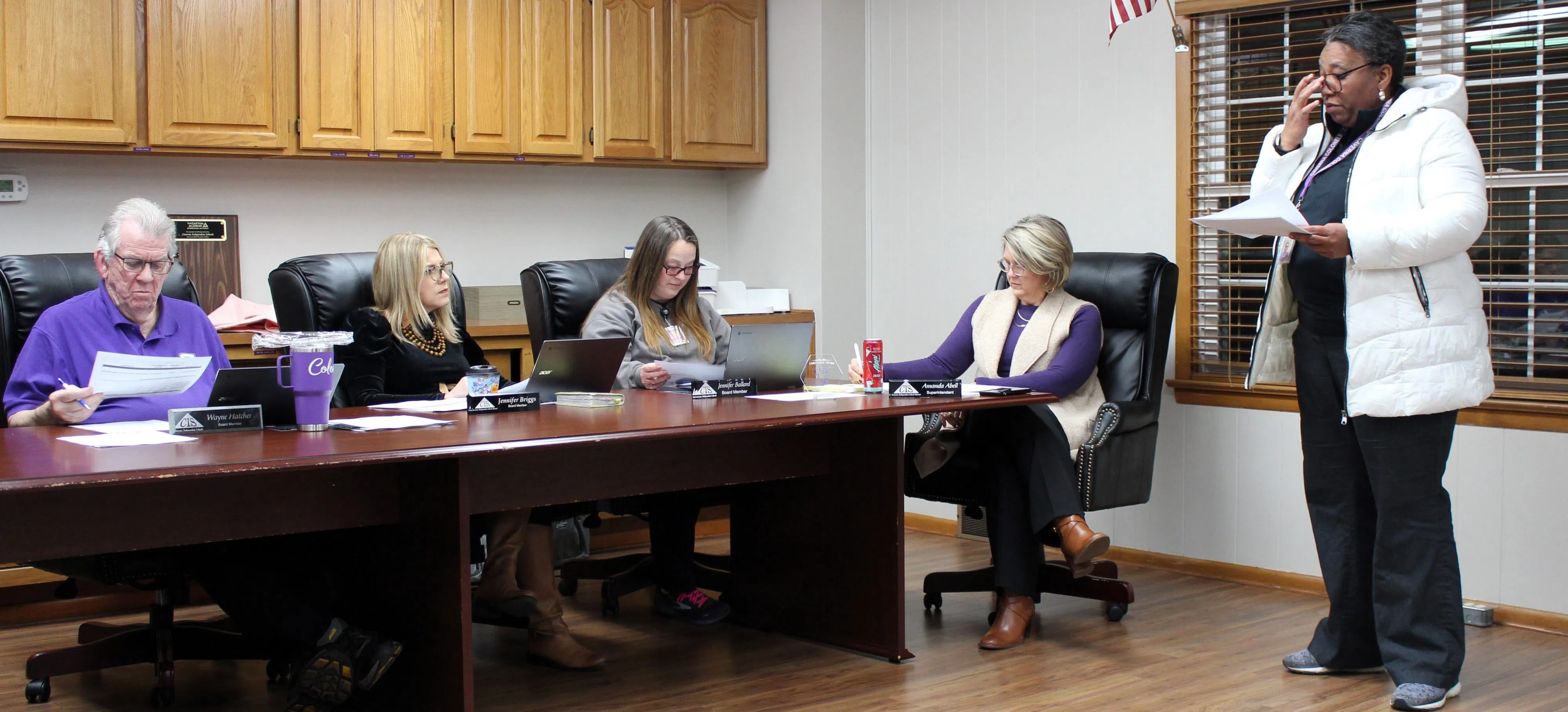By Gage Wilson
For Glasgow News 1
Caverna Schools Board of Education began the new year with agenda items that included the election of a new chairman, test score reports and improvement strategies, and discussion on the possibility of live streaming its meetings.
With distinctions and recognitions given out the board moved into presentations by each of the districts’ principals explaining their respective schools’ MAP data. Caverna High School Principal Frank Beauchamp led with “walkthroughs” done at the high school where an “observer” would visit classrooms to gauge factors like student engagement. This engagement was a main focus for the school as the administrator described two plans of action his staff is enacting. The first, he explained, was gearing educators toward more stimulating lesson plans, which will be reviewed by the administration. This strategy takes on a more passive attempt at arresting attention, “so the students aren’t tempted to take their phone out.”
The second plan met some scrutiny from the board. Beauchamp explained that students who were failing a core class risked being pulled out of an elective class. “I’ll give you an example, we have pulled a student from band,” he said. “Well they really want to go back to band, but this student has very low science scores, and they have to have science to graduate.”
Board Member Allison Dennison questioned the efficacy of this method. “So if you’re pulling them out of an elective class how are they going to make up the assignments from the elective?” she asked. “As a parent, I just worry that by pulling that student, their elective grade will drop.”
Beauchamp responded that while this is a possibility, he has yet to see this since utilizing this policy.
Making her debut, Caverna’s newest board member and chairman, Jennifer Briggs, inquired on how quickly students responded to these measures. Beauchamp said, “Most of the time they want to get back.”
Overall the presentations done by the district all hammered the same point, that of Novice score reduction and the overall improvement of its curriculum. Briggs ended each presentation by engaging each principal to reach out to the board with ideas on how the body could better serve the schools.
The board next passed the School and Community Nutrition Physical Activity Report Card, which is a document that outlines a school district’s efforts and achievements in promoting healthy eating and physical activity among students. These reports are often required by state or federal guidelines to ensure compliance with wellness policies. While seemingly a piece of mundane bureaucracy, the discussion surrounding the approval gave a glimpse into the, often overlooked, department of food service at the school.
“There weren’t really any significant changes from last year,” said food service director Donald Wilson. “As far as the nutritional guidelines there were some changes.”
Wilson said his department faced the dual challenge of making a palatable dish for students, while complying with ever increasing restrictions. “Every time they make changes to the requirements and restrictions, it makes it a lot more difficult for us to make food that kids like,” he said. “Unfortunately for us, trying to get kids to eat the vegetables is difficult, at the elementary level. If it’s not chicken nuggets or pizza they’re not really interested.” Wilson did note that middle and high school students were more open to versatile menu options.
He also brought up the amount of food waste his department sees. “As the USDA continues to restrict things like sodium content it’s going to make it harder on us. The most frustrating thing for me is seeing the money that we spend to provide this food goes straight from the serving line to the trash.”
The board unanimously voted to approve the report card.
The board also discussed the matter of live streaming its regular meetings on social media
“When Mrs. Abell and I had done our meet-and-greet, we talked about how it might be good to record our sessions because we cover so much content,” Briggs said. “So to help us stay organized, having a recording platform to go with our minutes, would be a good idea.”
Board member and former chair Dwayne Hatcher said he was “not … wild about having the meetings streamed online.” He said the board has not had any issues not streaming the meetings, and also expressed fears that the board’s invocation may cause unrest. Hatcher also pointed to community members critical of the district, who may stymie the board’s work being emboldened by their online anonymity. “Sometimes our meetings don’t always go real positive,” Hatcher stated. “There’s always someone who wants to be critical of our district and that’s just the way it is.”
Superintendent Amanda Abell also commented on the matter of streaming as she has been asked by the district’s staff if it would be mandatory for them to do presentations with the understanding that they would be on social media. “That may have to be a policy that the board sets,” Abell said. “That an employee that doesn’t want to be audio recorded and put on a public platform, that they are forced to be.”
“I’m all for recording our meetings, I’m all for video recording,” she said. “I’m just not sure about posting it publicly…if we are going to do any kind of recording posted publicly I would respectfully ask the board to make sure to treat our employees presenting to the board with professionalism.”
This comment segued into a somber announcement made by Briggs in regard to a letter of resignation sent to each board member. This letter’s outline maintained that the employee was leaving due to their treatment by the board, prompting a call for a closed session to further discuss the letter’s details and how the district should respond. Ultimately, members agreed that the February meeting would address the board’s concerns.
Shortly thereafter, members voted to adjourn. Caverna’s next meeting will be Feb. 13 at Caverna Central Office.















Comments